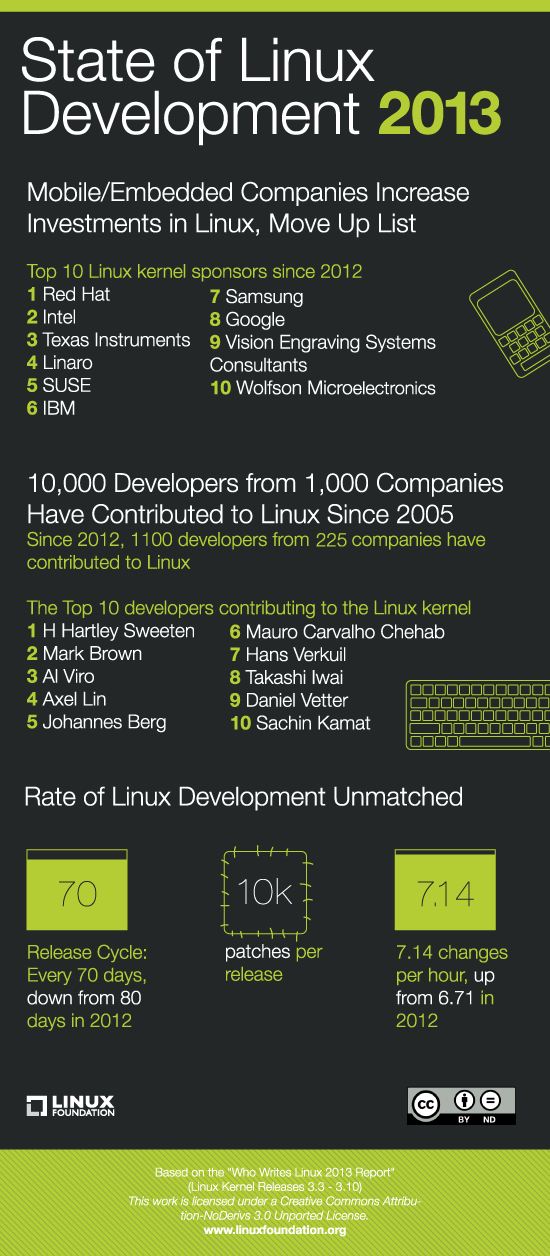 One of the greatest impacts Linux is having on the technology industry is in the way it’s built. We often tout Linux’s success stories – from running Facebook, Amazon and Google to powering eight out of 10 financial trades to running the world’s supercomputers and mobile devices, and more. But these successes are the results of a massive collaborative development effort that is 22 years in the making and today is being studied and leveraged by everyone from software developers to business executives in industries ranging from networking to financial services to life science and more.
One of the greatest impacts Linux is having on the technology industry is in the way it’s built. We often tout Linux’s success stories – from running Facebook, Amazon and Google to powering eight out of 10 financial trades to running the world’s supercomputers and mobile devices, and more. But these successes are the results of a massive collaborative development effort that is 22 years in the making and today is being studied and leveraged by everyone from software developers to business executives in industries ranging from networking to financial services to life science and more.
One of the things we do each year is partner with Linux kernel developers Jon Corbet and Greg Kroah-Hartman to understand the rate at which Linux is being developed, who is writing the code and what companies are sponsoring that work. The result is our annual “Who Writes Linux” report, which we’re releasing today atLinuxCon/CloudOpen. The report helps give us a glimpse into how Linux is able to rise and adapt to new technology requirements across industries more quickly than any other operating system. It’s truly history in the making.
Here are some of the highlights from this year’s paper:
* Linux is being developed faster than ever and faster than any other software in the world, accelerating tech innovations throughout the industry. The average number of changes accepted into the kernel per hour is 7.14, which translates to 171 changes every day and more than 1,200 per week (more stats are in the paper).
Ernst & Young was recently quoted saying we’re no longer in a 10-year reinvention path for enterprise IT. It’s now a 4-5 year path. They say it’s happening at a pace they’ve never seen before. In this world, Linux and collaborative development are the only way.
* More developers than ever are contributing to Linux. Nearly 10,000 developers from more than 1,000 companies have contributed to the Linux kernel since tracking began in 2005. Just since the last report, more than 1,100 developers from 225 companies have contributed to the kernel. And, Linux kernel 3.10 saw the most developer contributions ever.
* Mobile and embedded companies are increasing their investments in Linux. Linaro, Samsung and Texas Instruments together increased their aggregate contributions from 4.4 percent during the previous version of the paper to 11 percent of all changes this year. Google’s contributions are also up significantly this year. There were other notable shifts like Microsoft dropping in the rankings after the bulk of its Hyper-v work was finished.
Linux has dramatically changed the way software is built and distributed. Business executives today are trying to understand in a world where software is free how do they innovate? They have to find the value line, the line above which value is derived. Millions of dollars and thousands of engineering hours are being invested in collaboratively building software that is below the value line in order for companies to accelerate technology innovation on the products and services on which they can differentiate. And, it’s not just on Linux. OpenDaylight, OpenBEL andopenMAMA are all Collaborative Projects at The Linux Foundation that represent this trend and that are taking a page from the Linux playbook so they might make some history of their own.


